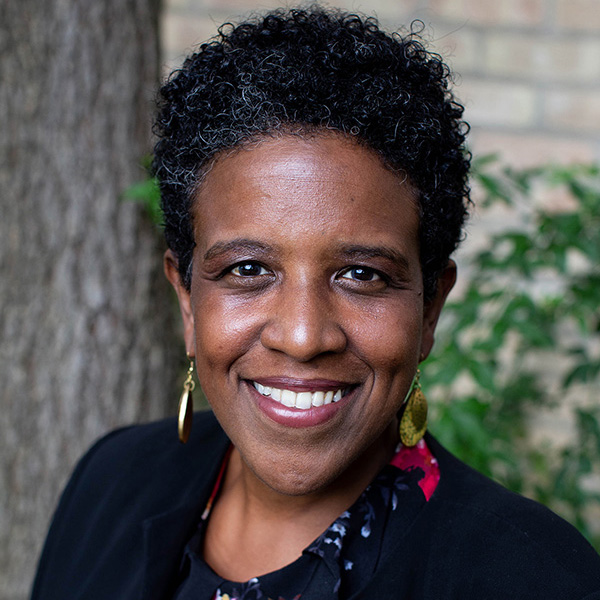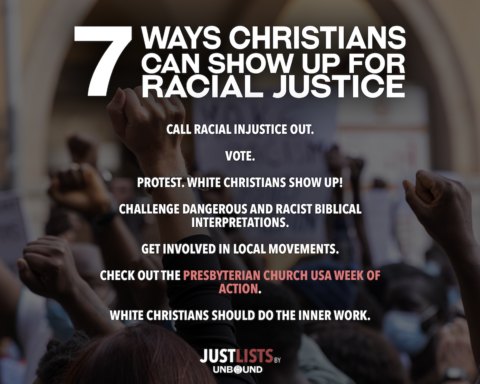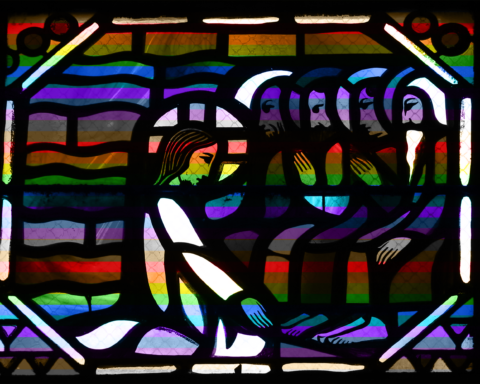Dr. Aymer spoke to the staff of Compassion, Peace, and Justice (CPJ) ministry unit of the Presbyterian Mission Agency via cellphone Zoom from outside Austin Presbyterian Theological Seminary where she is professor of New Testament. This was part of a meeting of all CPJ staff, including deployed staff, reflecting on the theological and Biblical grounding of their work. CPJ was in the fellowship hall of Shawnee Presbyterian Church on August 22, 2019.
Aymer:
What do you need to know about Matthew 25? (Joking response: “Everything!”)
Iosso:
The Presbyterian Mission Agency (PMA) lifts up this parable to combine both the personal response to Christ in people in need and the systemic awareness that the “Son of Man” is judging nations. There are three key applications of the text to doing justice in our mainly US context: structural racism, systemic poverty, and congregational vitality in addressing the first two, outside the church’s walls. We don’t want to reduce the Gospel even as we “operationalize” the parable’s themes. We would like to know more about how the parable works, including how the encounter with Jesus and judgment fit within Matthew’s Gospel. For example, we often don’t talk about what happens to the goats.
Aymer:
The lectionary leaves that out, too.
Let’s start with how the text works in Matthew. We need to start with some underlying premises for all of the texts in the New Testament. We do not know who wrote Matthew. But we are pretty sure about the following things:
- Matthew almost certainly had Mark’s Gospel, from which sections are taken verbatim.
- Thus Matthew is at best the second oldest of the Gospels.
- Matthew is written after the fall of Jerusalem (AD 70), for both Jews and the early Christians the greatest trauma in their living memory.
- A lot of the living generations never knew the Temple. The focus is on what it means to be a faithful Jew, a faithful believer in God, through understanding Jesus as Messiah, in light of the fact that all of this large tragedy has occurred.
- Thus the trauma of Jesus’ death by crucifixion and the trauma of the destruction of the Temple are entwined.
- This is an agrarian society under occupation and the occupying power is robbing the land of all its resources—this is the critique in Revelation as well.
- There are certainly persons who are poor, naked, thirsty, under guard awaiting whatever rough justice the Romans want to mete out. These are realities.
- The apocalyptic texts get at some of this overarching threat.
Another big theme in Matthew is that some people are not very nice—in fact, are evil, but yet are woven into the society and world and do not seem to be receiving any justice. The Temple has fallen and God has not responded, Jesus was crucified and is risen, and yet what do we do with the presence of the unjust as well as just mixed together? Matthew has the parable about the wheat and tares (weeds) mixed together, and the fisherman catching all kinds of fish and needing to sort them. The idea of people being sorted into good and bad is not new in Matthew, nor in the chapter 25 text, it is a common theme.
A third big theme is the concern for the oppressed and the poor, and especially for how the Christian church itself is being treated. This is important for us to remember as Western Christians, as we are generally in a position of safety and relative power. We have laws that protect our right to worship, to gather, we are considered legitimate, mainstream, and sometimes we have been (or are) the power behind the throne. This is not the situation of Matthew’s church.
Matthew was writing to a group that was illegitimate, that had no rights to gather, whose faithfulness was being questioned by both their own people, the Jews, and by the Romans, who saw them as treasonous. They had to gather in secret, as in the command to pray in secret earlier in the Gospel, where it is promised that the Father who sees and hears you in secret will reward you. It is thus not surprising that Matthew’s community is looking to God to avenge them and deliver them from those who are mistreating them. This makes sense. So then the question for 21st Century Christians is how do we operationalize this?
In my research on this aspect in response to your (CPJ) request, I was surprised to find a whole strand of readings of the text that argues that the only people being blessed in this text are Christians, the brothers and sisters of Jesus. It is an unusual text because it is the only text that uses to bless for (or on) human beings—except for that text on entering Jerusalem, “blessed is the one who comes in the name of the Lord.” So this is the only place using “eulogaio.” Those (generally conservative evangelical) Christians interpret this blessing to apply also to Gentiles who treat the Christians well. In fact, this may apply only to those who treat well those who are going off on mission—not to be applied more widely.
Again, that argument is premised on “whoever does it to the least of these brothers and sisters of mine…” Only the Christians count, then; they are the good guys. The danger of this reading is that they see themselves, or Christians—us—as the only people Jesus cares about. This reading may well have been widespread, before Constantine recognized the church and protected it. Even if that were the case, the question for us is who are the “least of these” and our “sisters and brothers” in our context (who have power)? Who are the strangers, those in prison, in need, sick, hungry… to whom we need to respond today? All of those adjectives would have indicated poverty and weakness in their culture. So who are the vulnerable among us? And what is the role of the church in light of that? This would be my broad framing of the text.
Judgment: I do think we need to think about judgment. As Reformed Christians, we are more focused on—enamored with– grace. We have all been given this wonderful gift, undeserved. At the same time, there are huge portions of scripture that remind us that God’s grace does not mean we get to be inactive. God’s grace still requires something of us (from Micah 6, for example). And that response (in James, Matthew, Isaiah, the Psalms…) has to do with feeding the hungry. This is not just a judgment on the faithful individual, but the faithful community and even nation. Much of the discourse (in OT) is about the nation and how it takes care of the hungry or most vulnerable. Matthew’s use of “ethne” can mean people, Gentiles, or nations. The whole passage could be read as applying to Gentiles (though probably not without Jews).
Pause for Question about Judgment and Politics in our somewhat polarized context.
Iosso:
Iosso noted Donald Trump’s visit to Louisville that day (for a public rally with a veteran’s group and a private fundraiser) which had disrupted traffic. The question was how to address these questions of national responsibility without being partisan, even if the matters of power were inherently political (involving community decision-making). How are the powers judged in this passage by our sovereign God, who is above all of them? How do we deal with our own judgmentalism (our Presbyterian self-righteousness of knowing we are right), when our gut level response is to condemn?
Aymer:
The Gospels are partisan. They are anti-Roman. They were written in the 1st Century, not the 21st. This is not a secret. It is reflected in the fact that Jesus was killed by the Romans. They did not like living under occupation. They did not like the way the Romans treated other people. Even in the later NT letters, where if you wanted to survive under the empire you were strategic, it’s not because they had a choice. So the Gospels are partisan, and they are political. But that does not translate to our judging a particular political party in our context for particular actions; I don’t think that is the way to apply the text. Rather, are we doing what we are supposed to be doing so that we will not be judged? The question is not what they are doing, but what we are called to be doing. The question is not on which side of a line are we stepping, but our faithfulness. It might mean opposing actions of a Republican or a Democratic government, or at the UN, or World Bank, or IMF (International Monetary Fund). Where do we stand? If we focus on doing our job, that should keep us busy till Jesus returns.
Further question: The image of the “Great Assize” or the Last Judgment before a heavenly court (see Romans 14:10) is a vivid one, but is Jesus or Matthew taking an existing image and putting Jesus in at the top, as “the son of man?”
Aymer:
Matthew is putting Jesus in the middle of a pre-existing framework, the expectation that God would judge the nations. It’s in Isaiah, other prophets, the Psalms, the idea that Yahweh is coming to judge on the “Day of the Lord.” It is a common image in the Hebrew Scriptures and thus not surprising to find in the Gospels. Sometimes the nations are judged in terms of how they treated Israel. And sometimes Israel is judged unfavorably and seen on the wrong side of history. So these judgment scenes are throughout the scriptures and Deuteronomy (for example) warns, “I will do this,” or Psalm 82, or Revelation.
The judgment is a time of “the rectification of all things.” This is what is meant by this sorting out to make everything right. In Matthew, there is a struggle of two spiritual forces, God and his angels and the devil and his angels. Christ comes with his angels and the goats are sent to the fire prepared by “the devil and his angels.” This is not just about human beings, but about spiritual forces (in part, systemic forces) working to ensure that the poor stay poor, the naked stay naked… and what Jesus is saying as the Son of Man figure about your/our caring for the least of these is also about our caring for the polis, the whole of the city, the people—political, without being partisan. The church has never not been political. People try to forget that MLK was involved in a political struggle, marching with Sunday School teachers—the church has always been political.
On the question of slavery, for example, we are observing the 400th anniversary of the 20 Africans being brought to Virginia in 1619. The arguments over slavery were going on in both sides of the church as well as in the culture, political arguments, related to how our faith tells us to govern ourselves. We are in an unusual time in the United States, and the president is the most unusual president in my memory and probably yours. History will judge what that means. However, as the church, we still face the question, are we feeding the hungry? Are we giving those who are thirsty something to drink? Are we clothing the naked? Are we tending to the sick? You know, those are still the questions that attend to us because the text does not say, if you do it to the emperor, you do it to me. Or if the emperor doesn’t do it, it’s a terrible thing. The text says, what do you do? It’s “you” plural. As much as you all are doing this, you do it for me.

Margaret Aymer joined the faculty of Austin Seminary in 2015. She teaches core courses on the Introduction to the New Testament, Exegesis, and Greek and elective courses in numerous disciplines including African Americans and the Bible, and feminist and womanist biblical interpretation. Active in the Society of Biblical Literature and American Academy of Religion, she has spoken as a guest lecturer at numerous academic and church conferences across the United States, including the 2013 MidWinter Lectures at Austin Seminary. There she was the Robert Jones Lecturer, offering a discourse on the “New Testament as Migrant Writings.” Aymer wrote Confessing the Beatitudes, the 2011 Horizons Bible Study (the annual Bible study resource for Presbyterian women), for which she won the Award of Excellence by the Associated Church Press.
Aymer has published four books: James: Diaspora Rhetorics of a Friend of God (Sheffield Publishing, 2014), Fortress Commentary on the Bible (with Gale A. Yee, Fortress Press, 2014); First Pure, then Peaceable: Frederick Douglass Reads James (T&T Clark, 2008), and Islanders, Islands and the Bible: Ruminations (Semeia Studies, 2015; with Jione Havea).
Prior to coming to Austin Seminary, Dr. Aymer taught at Interdenominational Theological Center in Atlanta, Georgia, since 2004. Aymer has served the Presbyterian Church (U.S.A.) broadly. She has served on the Presbyteries’ Cooperative Committee on Examinations since 2010, moderating the six persons who write the Bible Exegesis Ordination Examination for the Presbyterian Church (U.S.A.). She was a member of the Committee on Preparation of Ministry of the Presbyterian Church (U.S.A.) from 2010-2011, training sessions (governing bodies) of local congregations on the ordination process and their responsibilities therein. Aymer was also a member of the General Assembly Task Force on Civil Unions and Marriage (2009-2010), and she served as a steering committee member for the Committee on Theological Education Consultation on Racism from 2004-2008.






Unbound Social